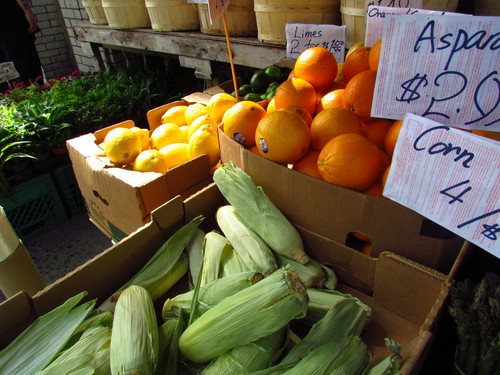| « Activists Removed After Protesting Lack of South Side Trauma Center | A Vietnam Veteran Reflects on Memorial Day » |
Environment/Sustainability Fri May 23 2014
GMO Labeling Fails to Take Hold in Illinois, So Far
Calls to label genetically modified organisms, or GMOs, are sweeping across the country. Last year, more than 20 state legislatures were considering GMO labeling bills. Studies show the majority of Americans support this effort. But in Illinois, the call for GMO food labeling has proven a fruitless endeavor thus far.
All food organisms have genetic material. Scientists can genetically modify food organisms and crops to enhance taste and quality, increase nutrients, improve resistance to pests and disease and promote robust growth.
In the US, genetic modification has expanded into almost every area of food production.
This has worried some people, including local organizations pushing for GMO labeling like Food and Water Watch Illinois and Right To Know GMO Illinois. They say genetically modified foods need to be labeled because they are untested and potentially unsafe.
Right to Know GMO says genetically modified foods pose potential health problems and environmental damage. They point out many developed nations do not consider GMOs to be safe.
"The chronic effects of eating GE (genetically engineered) foods are still largely unknown," Patty Lovera, assistant director of Food and Water Watch said. "Without labeling GE foods, we cannot associate any health problems with people who ate them because we don't know who ate them."
Of course, not everyone thinks GMOs are a bad idea. David Miller, president of the Illinois Biotechnology Industry Organization says GMO foods are safe and highly regulated.
"As a nation, we have ingested an estimated three trillion meals which includes GMO food advances without any documented ill effects -- no sneezes, no coughs and certainly no illnesses or deaths to show for them," Miller said.
Miller points to environmental benefits of genetically engineered foods as well. He says they create better crop yields, use fewer pesticides and provide food security in places with famine and malnutrition.
But GMO labeling advocates say label regulations would put the US in line with other industrialized countries around the world. Already, 64 countries including Russia, China, South Africa, Japan and all of the countries in the European Union have mandated labeling or outright banned GMO foods due to potential risks to consumers.
Closer to home, the US Food and Drug Administration says it uses a "science-based approach" to regulating food and ingredients made from genetically engineered plants to "help ensure they are safe to eat."
However, the American Academy of Environmental Medicines disagrees with the FDA's stance on GMO safety. The group cites several studies indicating serious health risks associated with GMO food consumption, and is calling for a moratorium to GMOs until further testing can be done.
Despite seemingly contrary scientific assessments regarding the safety of GMO foods, one thing is sure: Consumers want to know what they're eating.
According to a 2013 New York Times survey, over 93 percent of respondents said genetically engineered food should be clearly labeled for consumers.
The legislative tide is rising nationally on this issue and on May 8, Vermont became the first state to successfully pass GMO labeling legislation.
In Illinois, legislative efforts to label GMOs began early in 2013 with bills in the State House and Senate. More than a year later, these efforts have failed to materialize into law.
Illinois House Bill 3085, introduced by former Rep. Deborah Mell in February 2013 would have required the labeling of GMO foods. After numerous rounds of pinging between Rules Committee and Agriculture & Conservation Committee, the bill was last re-referred to Rules Committee in March. Despite picking up 14 co-sponsors along the way, HB 3085 has still has not been called for a vote.
Senate Bill 1666, introduced by Sen. David Koehler in February 2013, would have similarly required foods containing genetically modified ingredients be labeled as much. The specific ingredients would not have to be listed; only that GMOs are present.
"I'm dealing with this strictly as a consumer right-to-know bill," Sen. Koehler said. "I'm not saying yea or nay to the health risks. I'm saying consumers have the right to know and can make up their own mind."
During the past 15 months or so since its introduction, SB 1666 has bounced between Assignments, Environment and Agriculture and Conservation committees and picked up 20 co-sponsors --including Senate President John Cullerton -- along the way.
However, the bill was once more re-referred to Assignments Committee in April and has yet to be called for a vote.












